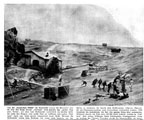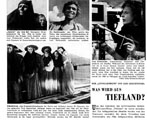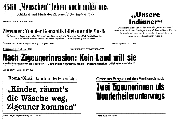In April 1945, Rosa Winter managed to escape during a march from Barth, a subsidiary camp of Ravensbrück, to the Schwarzenforst camp, together with seven women and two men, amongst them her future partner. She walked back to Linz. For more than a year, she searched for her family, but apart from one uncle, no one had survived. Her father had been gassed in the Buchenwald concentration camp, her mother and siblings had died in the gas chambers of Auschwitz, and one sister and an aunt had starved to death in the Bergen-Belsen concentration camp. She lived with her partner in a wagon on assigned locations in Linz, and worked as a fruit vendor. In 1946, her daughter was born, and her son was born in 1948. From 1966 onwards, the family lived in Vienna for a time, then they had an apartment in Upper Austria. Rosa Winter and her partner suffered the physical and psychological consequences of their concentration camp imprisonment for a long time. Her partner died of leukemia in 1985. Rosa Winter depended on social security for years. She was not entitled to a pension, because she was refused Austrian nationality until 1991. Only after that was she granted a victim's pension.
In 2004, she wrote the book „Uns hat es nicht geben sollen" (we were not supposed to exist) with her daughter Gitta and her granddaughter Nicole. In December 2004, she was awarded the Decoration of Merit in gold of the federal land of Upper Austria. Rosa Winter died on May 16th, 2005.
"Yes, why, what did I get out for? What for? Why me, when everybody else has died? It was a huge family. My father had lots of siblings, my mother had lots of siblings, and they all had children. And no-one got out … So I think, why me? I should have died, too, in the concentration camp. Then I would have been spared all this outside. All of it. If you are alone, and you don't have anyone to talk to."
"I was young and travelled around without a passport, without anything. And now I have the passport, and don't get anywhere, like only in this hole inside, where I am. They can take it away again, their passport. Really!"
"We never wanted the apartment. I wasn't used to that anyway. We would have gotten an apartment. But I said: „I won't move in there." And my husband said: „I won't move in there either." He said he would be shut in there."
Sinti in Austria after 1945
After 1945, the prejudice against the Sinti continued seamlessly from where National Socialism had left off. The persecution of the Sinti and Roma was often justified retrospectively as "the necessary precautionary measures of the criminal police". The Maxglan and Lanckenbach "gypsy camps" were not recognized as concentration camps. Also, many Sinti and Roma were stateless, and therefore did not have any claim to compensation. The government continued the settlement policy. Trade fines were frequent, and the possibility to live in wagons was restricted to a few assigned locations. Only in 1993 were Sinti and Roma fully recognized as victims of National Socialism.







